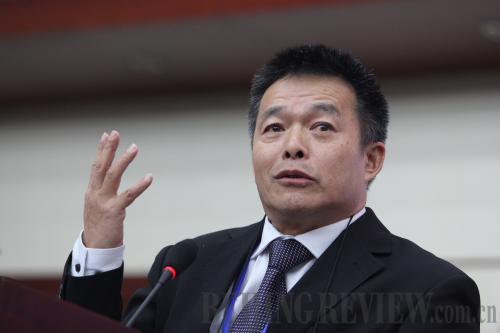|
 |
|
Hu Angang (CFP) |
To gauge public order and security, Hu inspected the two countries' homicide rates published in the Human Development Reports of the UN development Program. He found that between 2004 and 2011, 4.2 homicides per 100,000 people were reported annually in the United States, while 1.1 were reported in China.
Hu used medical insurance coverage to represent a level of basic social security. He found that the percentage of Chinese citizens without basic medical insurance dropped from 94.3 percent in 2001 to 1 percent in 2012, whereas in the United States, the percentage rose from 13.5 in 2001 to 15.4 in 2012.
In terms of scientific and technological innovation, using data from the World Intellectual Property Organization, Hu found that the number of patent applications in China increased by 23.5 percent annually from 2000 to 2012, while rising by just 5.2 percent in the United States.
Nevertheless, Hu admitted that China is confronted with its own problems, yet he is optimistic about finding future solutions.
Persistent study
Hu said that he has been intrigued by the numerous theories behind the creation of national governing systems for more than 20 years. In May 1993, Hu and Wang Shaoguang, a professor with the Chinese University of Hong Kong, published their Report on China's State Capacity. In the book, they concluded that state capacity is the most important precondition for a country to achieve industrialization and modernization. Thus, to improve China's state capacity was to improve the Central Government's ability to push forward reform and opening up. They pointed out the basic tasks of China's reform were to find political and fiscal systems that suited modern society and the national condition.
Several years later, in 2000, Hu, together with Wang and well-known scholar Zhou Jianming, set up a national governing system study group staffed by researchers in various fields like economics, politics, sociology, international relations and public policy. The group published a book on their findings in 2003, concluding that a country's modernization includes at least two aspects: economic modernization, that is, the modernization of the agriculture, industry, national defense and science and technology sectors and system modernization whose purpose is to create institutions to ensure good governance and long-term stability.
In 2007, the group translated Governance in China, a book published by the Organization for Economic Cooperation and Development in 2005. In the preface of the Chinese version, Hu wrote that a country's government is a special type of public good, and the state is its main provider; system building requires not only political will and goals, but also learning, innovation and the ability to execute these things.
These fields of study require a long time commitment, and understanding them cannot be accomplished overnight, Hu said, adding that China should continue to study and explore governing systems so as to best serve the people and the country with this knowledge.
Email us at: tangyuankai@bjreview.com |
